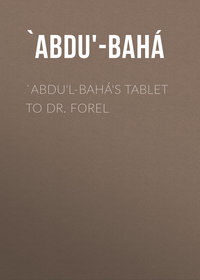Kitobni o'qish: «`Abdu'l-Bahá's Tablet to Dr. Forel»
‘ABDU’L-BAHÁ’S TABLET TO DR. FOREL1
[Pages 6–10]
O revered personage, lover of truth! Thy letter dated 28 July 19212 hath been received. The contents thereof were most pleasing and indicated that, praised be the Lord, thou art as yet young, and searchest after truth, that thy power of thought is strong and the discoveries of thy mind manifest.
Numerous copies of the epistle I had written to Dr. F. are spread far and wide and every one knoweth that it hath been revealed in the year 1910. Apart from this, numerous epistles have been written before the war upon the same theme, and reference, too, hath been made to these questions in the Journal of the San Francisco University, the date whereof is known beyond any doubt.3 In like manner have the philosophers of broad vision praised highly the discourse eloquently delivered in the above-named University.4 A copy of that paper is thus enclosed and forwarded. Thy works are no doubt of great benefit, and if published, send us a copy of each.
By materialists, whose belief with regard to Divinity hath been explained, is not meant philosophers in general, but rather that group of materialists of narrow vision who worship that which is sensed, who depend upon the five senses only, and whose criterion of knowledge is limited to that which can be perceived by the senses. All that can be sensed is to them real, whilst whatever falleth not under the power of the senses is either unreal or doubtful. The existence of the Deity they regard as wholly doubtful.
It is as thou hast written, not philosophers in general but narrow-minded materialists that are meant. As to deistic philosophers, such as Socrates, Plato and Aristotle, they are indeed worthy of esteem and of the highest praise, for they have rendered distinguished services to mankind. In like manner we regard the materialistic, accomplished, moderate philosophers, who have been of service (to mankind).
We regard knowledge and wisdom as the foundation of the progress of mankind, and extol philosophers who are endowed with broad vision. Peruse carefully the San Francisco University Journal that the truth may be revealed to thee.
Now concerning mental faculties, they are in truth of the inherent properties of the soul, even as the radiation of light is the essential property of the sun. The rays of the sun are renewed but the sun itself is ever the same and unchanged. Consider how the human intellect develops and weakens, and may at times come to naught, whereas the soul changeth not. For the mind to manifest itself, the human body must be whole; and a sound mind cannot be but in a sound body, whereas the soul dependeth not upon the body. It is through the power of the soul that the mind comprehendeth, imagineth and exerteth its influence, whilst the soul is a power that is free. The mind comprehendeth the abstract by the aid of the concrete, but the soul hath limitless manifestations of its own. The mind is circumscribed, the soul limitless. It is by the aid of such senses as those of sight, hearing, taste, smell and touch, that the mind comprehendeth, whereas the soul is free from all agencies. The soul as thou observest, whether it be in sleep or waking, is in motion and ever active. Possibly it may, whilst in a dream, unravel an intricate problem, incapable of solution in the waking state. The mind, moreover, understandeth not whilst the senses have ceased to function, and in the embryonic stage and in early infancy the reasoning power is totally absent, whereas the soul is ever endowed with full strength. In short, the proofs are many that go to show that despite the loss of reason, the power of the soul would still continue to exist. The spirit however possesseth various grades and stations.
As to the existence of spirit in the mineral: it is indubitable that minerals are endowed with a spirit and life according to the requirements of that stage. This unknown secret, too, hath become known unto the materialists who now maintain that all beings are endowed with life, even as He saith in the Qur’án, ‘All things are living’.
In the vegetable world, too, there is the power of growth, and that power of growth is the spirit. In the animal world there is the sense of feeling, but in the human world there is an all-embracing power. In all the preceding stages the power of reason is absent, but the soul existeth and revealeth itself. The sense of feeling understandeth not the soul, whereas the reasoning power of the mind proveth the existence thereof.
In like manner the mind proveth the existence of an unseen Reality that embraceth all beings, and that existeth and revealeth itself in all stages, the essence whereof is beyond the grasp of the mind. Thus the mineral world understandeth neither the nature nor the perfections of the vegetable world; the vegetable world understandeth not the nature of the animal world, neither the animal world the nature of the reality of man that discovereth and embraceth all things.
The animal is the captive of nature and cannot transgress the rules and laws thereof. In man, however, there is a discovering power that transcendeth the world of nature and controlleth and interfereth with the laws thereof. For instance, all minerals, plants and animals are captives of nature. The sun itself with all its majesty is so subservient to nature that it hath no will of its own and cannot deviate a hair’s-breadth from the laws thereof. In like manner all other beings, whether of the mineral, the vegetable or the animal world, cannot deviate from the laws of nature, nay, all are the slaves thereof. Man, however, though in body the captive of nature is yet free in his mind and soul, and hath the mastery over nature.
